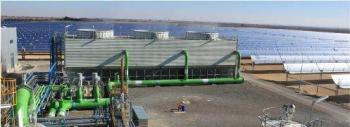May 28 2014
The Hysol project aims to integrate biomethane in concentrating solar thermal power plants to achieve a better efficiency, productive capacity and a reduction in its carbon footprint.
 The thermosolar plant of Manchasol./ Hysol
The thermosolar plant of Manchasol./ Hysol
The integration of biomethane in concentrating solar thermal power plants would facilitate the commercial introduction of concentrating solar power (CSP) technology in the energy market, reducing both financial and environmental costs. Researchers belong to the European consortium of the Hysol project, who is led by the ACS-Cobra company, with the participation of Universidad Politécnica de MadridUniversidad Politécnica de Madrid (UPM) researchers. Currently, they are studying the integration process of biomethane. In order to conduct the validation of this process, this project is expected to build a pre-industrial plant located at the cluster of thermosolar innovation of Manchasol.
Sun is a free, renewable energy resource that can be used for large-scale electricity production. When using CSP technology, extremely high temperatures (400-1000 ºC) are reached which can move thermodynamic cycles similar to that are used in conventional power plants.
Spain is a pioneering country in the technological and commercial development of CSP technology, with 48 operating plants of 2204 Wme of capacity. United States has 20 thermosolar plants (956 MWe) and other countries with access to optimal solar resources (China, India, Israel, Mexico, South Africa, Algeria, Egypt, Morocco, Australia, Chile, etc) have commercial plants or are under construction. The International Energy Agency (IEA) expects a large increase in the contribution of this technology for the worldwide electrical production with a capacity of 147 GW by 2020 and 1089 GW by 2050.
A big issue of CSP technology is that electrical generation depends on solar cycles, seasonal cycles and weather conditions. In order to increase the capacity and the power production control, these types of plants usually have thermal storage systems based on the usage of fossil fuels, mainly natural gas. The combustion of natural gas in simple cycles, such as the ones used in conventional power plants, can achieve reduced energy efficiency and can considerably increase the carbon footprint of the plant.
The ability to hybridize solar energy with other renewable energy resources such as biomethane considerably improves the financial viability of this technology, allowing a production of 100% renewable electricity. Gas consumption from renewable energy (biogas, biomethane or syngas) makes possible the usage of combined cycle technologies which are more efficient, sustainable and competitive.
The Spanish company ACS-Cobra is leading the Hysol European project (Innovative Configuration of a Fully Renewable Hybrid CSP Plant, FP7-Energy-2012-1. CP 308912), that aims to develop a new concept of a thermosolar/biomethane hybrid plant. This project involves the development, construction, operation and optimization of a pre-industrial infrastructure that will be based in the cluster of thermosolar innovation of Manchasol owned by ACS-Cobra. This facility will allow the research of biomass fuels integration in the gas phase (biogas, biomethane or syngas) at pre-industrial scale. This project will also be used as initial phase to verify and make financeable the technology in the market.